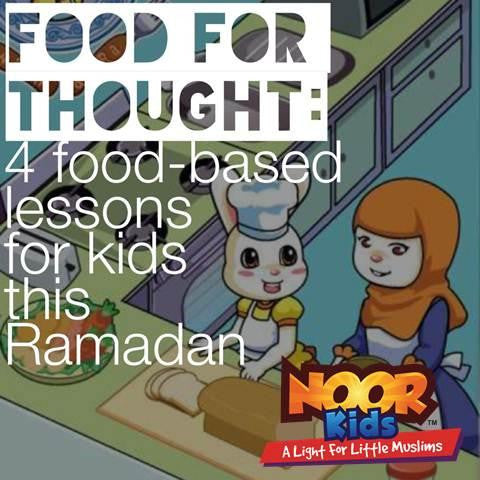

· By Amin Aaser
Food for thought this Ramadan (for your kids)
by Ali Daya, Research Associate, Noor Kids

Iftaar=Futoor, Sehri=Suhoor. Call it what you like, it’s food for all. Eating, or, specific to the month of Ramadan, the breaking of the fast, is universal. Food is an important theme of this Holy month. And, as parents, an important source of teaching. Below are four of the most important lessons we should be taking away from food.
1. After difficulty, there comes ease.
The breaking of the fast is a beautiful concept in its own right. After a (long) day of exercising restraint... of pushing our body and soul to its limit... we feel a comfort when it is time to break our fast. As obvious as it is, sometimes we forget to meditate on this: fasting is a test. It is a challenge. It is not meant to be easy.
But once the sun does set, we claim victory. Our lips taste the sweetness of water. And with it, we are comforted.
Key Lesson: Allah (SWT) promises, Surely, after hardship there is ease (94:7). After a hard day of fasting, food is our comfort. Use this as a teachable moment about God's promise.
2. No matter our differences, we are all human.
It doesn't take a Muslim to understand the toil of fasting; rather, it takes a human. Every time I tell a non-Muslim about fasting, they understand the challenge -- because everyone needs to eat!
Conflicts are the source of war. But as human beings, how different are we? No matter our differences in religion, race, ethnicity, or the like, we are all human. Because of this similarity, we can feel empathy for another in our most innate self. If someone is hungry, sick, or oppressed, we can feel for them. Not because they are Muslim or non-Muslim; rather, because they are human.
Key Lesson: Just as all humans can appreciate the hunger of fasting, so too should we feel the challenges of others. Hazrat Ali illustrates this point in a letter to Malik al-Ashtar on governance, saying "Man is either your brother in faith, or your brother in humanity."
3. Muslims are an Ummah, a community.
When we pray, we are recommended to pray together. When we go on pilgrimage, we go together, Similarly, when we fast, we are recommended to break fast together. This community orientation is Islamic culture.
Young or old, Egyptian or Persian, black or white, we eat. It is really as simple as that. While some aspects in Islam are contested, the opening of the fast at sunset in Shahr Ramadan is unanimous. Subhanllah.
Culture, as defined by social scientists, is created through shared experiences. In Islam, the shared experience of fasting helps define Muslim culture. We cultivate a Muslim culture through this shared experience of fasting (and breaking our fast).
Key Lesson: As diverse as Islam is, we all share a Muslim culture through acts of worship that we perform together. An example, is breaking our fasts together. The Prophet (SAW) says, "O people! Whoever among you breaks the fast of a believer during this month will receive a reward equal to one who set a slave free, and he will receive forgiveness for all his past sins."
4. You are what you eat.
While we often meditate about the spiritual aspect of fasting, that is getting closer to Allah (SWT), we can forget about a physical phenomenon - fasting cleanses the body.
While new research has gone semi-viral this year on the potential cancer-fighting properties of fasting, humans have long known that fasting is a means to purge the body of impurities. Who is it that places impurities into the body? We do.
It is an old adage, but absolutely true -- we are made of what we eat. Perhaps this can be taken literally, with food, but perhaps metaphorically with other items which we consume -- all that which we hear, see, and feel.
Key Lesson: Our body is effected by what we put into it. Consume pure and noble items (not limited to food). The Holy Qu'ran narrates that before Lady Mariam gave birth to Prophet Isa (SAW), she ate food which came from heaven. Subhanallah.
In summary...
